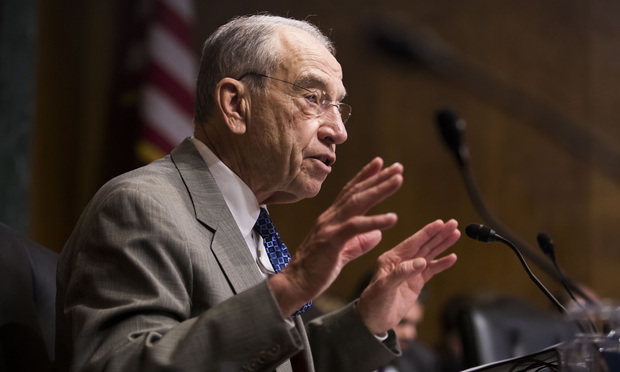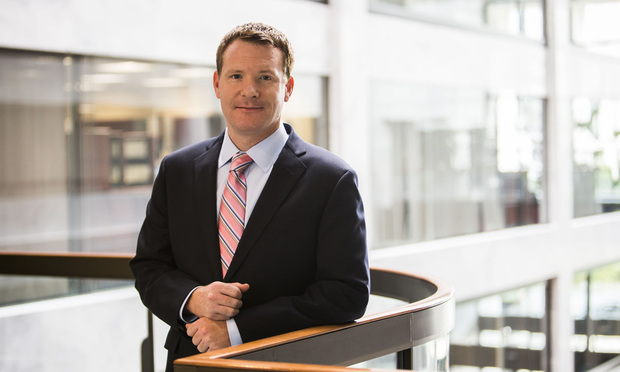Senate Lawyers Navigate Complexities of Kavanaugh Sexual Assault Hearing
Teams of congressional lawyers are working behind the scenes on the contours of a hearing where California professor Christine Blasey Ford would confront U.S. Supreme Court nominee Brett Kavanaugh.
September 20, 2018 at 06:46 PM
6 minute read
 Sen. Charles Grassley, R-Iowa, during a Senate Judiciary Committee confirmation hearing, on Nov. 15, 2017. Credit: Diego M. Radzinschi / ALM
Sen. Charles Grassley, R-Iowa, during a Senate Judiciary Committee confirmation hearing, on Nov. 15, 2017. Credit: Diego M. Radzinschi / ALM
U.S. Senate Republicans were reportedly moving to hire outside counsel to handle the questioning of Christine Blasey Ford at what was still an uncertain public hearing where she would claim Supreme Court nominee Brett Kavanaugh sexually assaulted her decades ago in high school.
Ford's attorney, Debra Katz of Washington's Katz Marshall & Banks, on Thursday told Judiciary Chairman Charles Grassley, R-Iowa, that Ford was willing to testify next week but only under certain conditions and with assurances of her safety, according to reports. Katz did not repeat a demand, made earlier this week, that the committee first ask the FBI to investigate her allegations before a hearing took place.
Kavanaugh, meanwhile, who has denied the assault allegations, has been spending his days this week prepping for the hearing with the assistance of White House officials and former clerks, according to a Senate aide.
“Since the moment I first heard this allegation, I have categorically and unequivocally denied it. I remain committed to defending my integrity,” Kavanaugh said in a letter to Grassley on Thursday.
Ford has been working with communications expert and political strategist Ricki Seidman, according to news reports. Seidman is a former aide to the late Sen. Ted Kennedy who played a key role in getting Anita Hill to testify in 1991 against Clarence Thomas at his Supreme Court confirmation hearing. Seidman also helped with the Supreme Court confirmation of Justice Sonia Sotomayor.
Behind all the wrangling over the planned hearing next week pitting Ford against Kavanaugh, teams of congressional lawyers are working long hours, negotiating the contours of the showdown.
Almost immediately after Kavanaugh's nomination was announced in July, Grassley brought on a team of special counsel lawyers and law clerks to shepherd the nomination, with attorneys combing through documents and working on other legal matters, according to the Senate aide.
 Mike Davis, chief counsel for nominations at Senate Judiciary Committee. Credit: Diego M. Radzinschi / ALM
Mike Davis, chief counsel for nominations at Senate Judiciary Committee. Credit: Diego M. Radzinschi / ALMA top adviser to Grassley—Mike Davis, the committee's chief counsel for nominations and a former clerk to Justice Neil Gorsuch—came under criticism over a tweet that appeared to state Republicans were “unfazed and determined” to confirm Kavanaugh. Davis later deleted the tweet, saying he had been referring to “Democrats' partisan attacks and their refusal to take part in the committee's thorough and fair investigation.”
This summer, Sen. Dianne Feinstein of California, the judiciary committee's ranking Democrat, hired Marc Hearron from Morrison & Foerster to be her chief counsel on nominations. Feinstein last year appointed Jennifer Duck to lead the Democratic judiciary committee staff. Duck had been Feinstein's chief of staff since 2013, when she left Pfizer Inc. Duck was vice president of government relations and corporate leadership at the drugmaker.
Democratic and Republican senators on Thursday continued to spar in the press and on social media over whether the FBI should first investigate Ford's allegations before any public testimony and whether to call additional witnesses.
At a press conference Thursday, Sen. Kirsten Gillibrand, D-New York, said Ford shouldn't testify without the FBI first investigating her claims that Kavanaugh groped her when they were both teenagers. Gillibrand noted that the FBI had investigated law Hill's sexual harassment claims before she testified during at Thomas' confirmation hearing.
Jeffrey Peck, formerly majority counsel and staff director of the Senate Judiciary Committee during the 1991 Thomas-Hill hearings, said there was no debate during those proceedings over whether the FBI would investigate. “Everyone agreed the FBI should investigate Prof. Hill's allegation, which is obviously a sharp contrast from today,” Peck said Thursday in an interview.
The more difficult questions, he said, focused on which witnesses would testify, how many and in what order.
Peck recalled the Thomas-Hill hearings as a “chaotic ” time.
“ It's difficult for members, difficult for staff, for the person making allegations and the accused, and things are generally more compressed than you want them to be,” said Peck, now a lobbyist at Washington's Peck Madigan Jones.
Dennis Burke, of counsel at Ballard Spahr in Phoenix, was a majority counsel during the Thomas-Hill hearings. He described those hearings as “surreal to this day.” The committee, Burke said, was in “uncharted territory and no one had a full sense of how it was going to play out. There was no process or procedure with how to deal with a scenario like that.”
Senate committees are set up for hearing bills and offering amendments and compromising on legislation, Burke said. “This is not a process about compromise. It's about, 'Are we going to vote this person out or not?'”
Burke described the process as “extremely tense and bewildering.” He continued: “You have to get Democratic and Republican staff both in the room—who is in the room and what questions were to be asked? What do we do with what comes out of the interview? Does the person testify? Who is going to be on the person's panel? The other side says, 'If that person is on your panel, we want so and so on our panel.'”
Peck said the committee should have rules put in place—rules that neither side can change—for any future situation. “There ought to be agreement when something like this comes up that the FBI re-opens the investigation and there's no set timeframe but a reasonable amount of time to investigate, and what role the staff has in the investigation,” he said.
“On the one hand, it's chaotic and a tremendous amount of work,” Peck said. “On the other hand, it's not something you throw up your hands and do nothing.”
Read more:
Get Ready for an 8-Justice Supreme Court, as Kavanaugh Controversy Persists
Everyone in the Kavanaugh Controversy Is Lawyering Up
Kavanaugh, Amid Sexual Assault Claim, Reportedly Hires Beth Wilkinson
Female Clerks Stand by Kavanaugh Despite Assault Allegation
Lawyers Who Guided Anita Hill Offer Advice to Kavanaugh's Accuser
This content has been archived. It is available through our partners, LexisNexis® and Bloomberg Law.
To view this content, please continue to their sites.
Not a Lexis Subscriber?
Subscribe Now
Not a Bloomberg Law Subscriber?
Subscribe Now
NOT FOR REPRINT
© 2025 ALM Global, LLC, All Rights Reserved. Request academic re-use from www.copyright.com. All other uses, submit a request to [email protected]. For more information visit Asset & Logo Licensing.
You Might Like
View All
Bankruptcy Judge Clears Path for Recovery in High-Profile Crypto Failure
3 minute read
Government Attorneys Face Reassignment, Rescinded Job Offers in First Days of Trump Administration
4 minute read
DC Judge Chutkan Allows Jenner's $8M Unpaid Legal Fees Lawsuit to Proceed Against Sierra Leone
3 minute readTrending Stories
- 1We the People?
- 2New York-Based Skadden Team Joins White & Case Group in Mexico City for Citigroup Demerger
- 3No Two Wildfires Alike: Lawyers Take Different Legal Strategies in California
- 4Poop-Themed Dog Toy OK as Parody, but Still Tarnished Jack Daniel’s Brand, Court Says
- 5Meet the New President of NY's Association of Trial Court Jurists
Who Got The Work
J. Brugh Lower of Gibbons has entered an appearance for industrial equipment supplier Devco Corporation in a pending trademark infringement lawsuit. The suit, accusing the defendant of selling knock-off Graco products, was filed Dec. 18 in New Jersey District Court by Rivkin Radler on behalf of Graco Inc. and Graco Minnesota. The case, assigned to U.S. District Judge Zahid N. Quraishi, is 3:24-cv-11294, Graco Inc. et al v. Devco Corporation.
Who Got The Work
Rebecca Maller-Stein and Kent A. Yalowitz of Arnold & Porter Kaye Scholer have entered their appearances for Hanaco Venture Capital and its executives, Lior Prosor and David Frankel, in a pending securities lawsuit. The action, filed on Dec. 24 in New York Southern District Court by Zell, Aron & Co. on behalf of Goldeneye Advisors, accuses the defendants of negligently and fraudulently managing the plaintiff's $1 million investment. The case, assigned to U.S. District Judge Vernon S. Broderick, is 1:24-cv-09918, Goldeneye Advisors, LLC v. Hanaco Venture Capital, Ltd. et al.
Who Got The Work
Attorneys from A&O Shearman has stepped in as defense counsel for Toronto-Dominion Bank and other defendants in a pending securities class action. The suit, filed Dec. 11 in New York Southern District Court by Bleichmar Fonti & Auld, accuses the defendants of concealing the bank's 'pervasive' deficiencies in regards to its compliance with the Bank Secrecy Act and the quality of its anti-money laundering controls. The case, assigned to U.S. District Judge Arun Subramanian, is 1:24-cv-09445, Gonzalez v. The Toronto-Dominion Bank et al.
Who Got The Work
Crown Castle International, a Pennsylvania company providing shared communications infrastructure, has turned to Luke D. Wolf of Gordon Rees Scully Mansukhani to fend off a pending breach-of-contract lawsuit. The court action, filed Nov. 25 in Michigan Eastern District Court by Hooper Hathaway PC on behalf of The Town Residences LLC, accuses Crown Castle of failing to transfer approximately $30,000 in utility payments from T-Mobile in breach of a roof-top lease and assignment agreement. The case, assigned to U.S. District Judge Susan K. Declercq, is 2:24-cv-13131, The Town Residences LLC v. T-Mobile US, Inc. et al.
Who Got The Work
Wilfred P. Coronato and Daniel M. Schwartz of McCarter & English have stepped in as defense counsel to Electrolux Home Products Inc. in a pending product liability lawsuit. The court action, filed Nov. 26 in New York Eastern District Court by Poulos Lopiccolo PC and Nagel Rice LLP on behalf of David Stern, alleges that the defendant's refrigerators’ drawers and shelving repeatedly break and fall apart within months after purchase. The case, assigned to U.S. District Judge Joan M. Azrack, is 2:24-cv-08204, Stern v. Electrolux Home Products, Inc.
Featured Firms
Law Offices of Gary Martin Hays & Associates, P.C.
(470) 294-1674
Law Offices of Mark E. Salomone
(857) 444-6468
Smith & Hassler
(713) 739-1250









